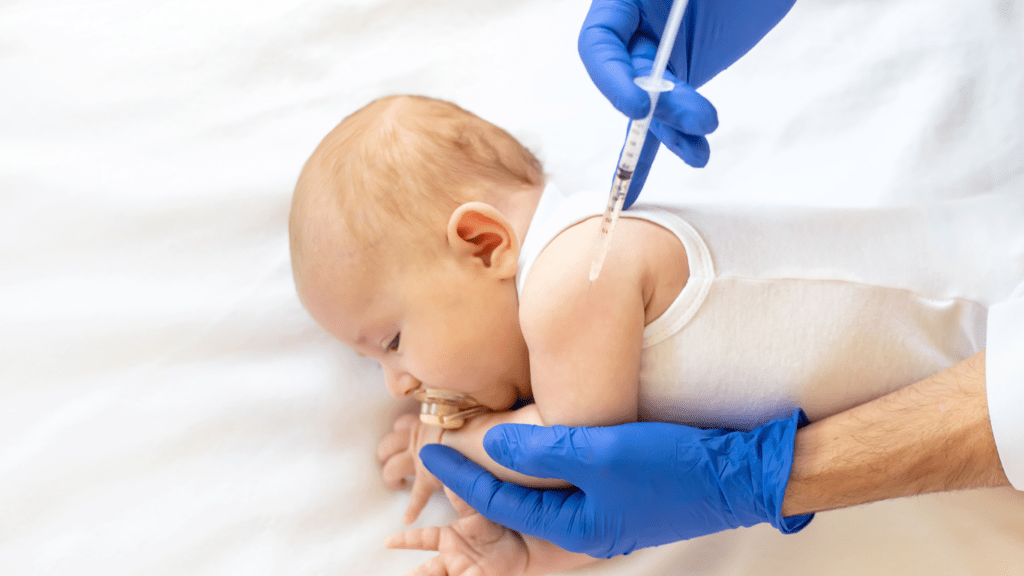Importance of Newborn Vaccinations
Vaccinations protect newborns from serious diseases by boosting their immune systems. Infants are vulnerable to illnesses like:
- measles
- polio
- whooping cough
which can cause severe complications or death. Immunizations help prevent these diseases.
Vaccinating newborns also contributes to herd immunity. When most of the population is immunized, the spread of contagious diseases gets limited. This protects those who can’t be vaccinated, like infants too young to receive certain vaccines or individuals with weakened immune systems.
Newborn vaccinations follow a carefully researched schedule. Health authorities like the CDC recommend starting vaccinations at birth and continuing them throughout childhood. This schedule ensures timely protection as infants are exposed to different environments and social interactions.
Adverse reactions to vaccines are rare and usually mild. Common side effects include swelling, fever, or soreness at the injection site. Serious complications are extremely rare compared to the health risks posed by the diseases that vaccines prevent.
Parents need to prioritize their baby’s health by ensuring timely vaccinations. Consulting with a pediatrician helps address concerns and provides accurate information on vaccination benefits.
Recommended Vaccination Schedule
Health authorities advise starting newborn vaccinations at birth, continuing through childhood. This schedule ensures timely protection against various diseases.
First Months Vaccinations
During the first months, newborns receive essential vaccines. At birth, the Hepatitis B vaccine is administered to prevent liver infections. By two months, infants get the DTaP (Diphtheria, Tetanus, Pertussis), IPV (Polio), Hib (Haemophilus influenzae type b), PCV13 (Pneumococcal), and the first dose of the Rotavirus vaccine. These prevent serious conditions like whooping cough, pneumonia, and polio. At four months, the same vaccines given at two months are repeated to ensure the baby’s immune system is reinforced.
Following Year Vaccinations
In the following year, additional vaccines ensure continued protection. By six months, infants get another round of DTaP, IPV, Hib, PCV13, and a second dose of the Rotavirus vaccine. Between 6-12 months, the annual flu vaccine is recommended to protect against influenza. At 12 months, the MMR (Measles, Mumps, Rubella) and Varicella (chickenpox) vaccines, along with the Hepatitis A vaccine, are administered. These prevent highly contagious and potentially severe diseases, ensuring comprehensive protection as the child grows.
Common Vaccines and Their Benefits
Newborn vaccinations include several key vaccines. Understanding their benefits helps parents make informed decisions.
Hepatitis B
The Hepatitis B vaccine protects against the Hepatitis B virus. Administered at birth, it prevents chronic liver infections, which can lead to liver cancer and cirrhosis. The vaccine’s effectiveness is high, with over 90% of infants developing immunity after the full series of three doses. Hepatitis B can be transmitted through bodily fluids, making early vaccination crucial for newborns.
DTaP
The DTaP vaccine covers three diseases: Diphtheria, Tetanus, and Pertussis (whooping cough). Diphtheria causes breathing problems, heart failure, and paralysis; Tetanus causes severe muscle spasms and stiffness; Pertussis leads to uncontrollable coughing and breathing difficulty. The DTaP vaccine, given in multiple doses starting at two months, significantly reduces the incidence of these deadly diseases. Herd immunity benefits by decreasing the spread of bacterial infections in the community.
Polio
The Polio vaccine prevents Poliomyelitis, a disease causing paralysis and potentially lifelong disability. Before vaccines, polio outbreaks paralyzed thousands of children annually. Given at two, four, and between 6-18 months, the Inactivated Polio Vaccine (IPV) offers strong protection. Global vaccination efforts nearly eradicated polio, demonstrating the vaccine’s effectiveness.
Addressing Parental Concerns

Parents often have concerns about newborn vaccinations, stemming from questions about safety and potential side effects. Let’s delve into some common concerns and provide accurate information to help parents make informed choices.
Safety and Side Effects
I understand that safety is a top priority for parents. Vaccines undergo rigorous testing before approval to ensure they are safe and effective. Side effects are typically mild and temporary.
- Common Side Effects: Newborns may experience minor side effects like swelling, soreness, or a mild fever. These reactions usually resolve within a few days.
- Serious Complications: Serious side effects are extremely rare. The benefits of vaccines far outweigh the low risk of serious complications, offering crucial protection against life-threatening diseases like measles and whooping cough.
- Monitoring: Health authorities constantly monitor vaccines for safety. Any potential issues are promptly investigated and addressed to maintain public trust and health.
Myths and Facts
Misconceptions about vaccines can create unnecessary fear. It’s important to distinguish facts from myths to make confident decisions for your baby’s health.
- Autism Myth: One of the most pervasive myths is that vaccines cause autism. Numerous scientific studies have debunked this claim. The CDC, WHO, and other health organizations confirm that vaccines do not cause autism.
- Overloading the Immune System: Another concern is that multiple vaccines might overload a newborn’s immune system. In reality, babies are exposed to many more antigens daily than those in vaccines. Vaccines are designed to work with, not overwhelm, their immune systems.
- Natural Immunity: Some parents believe natural immunity is preferable to vaccine-acquired immunity. While natural immunity can occur, it’s often preceded by dangerous illnesses that vaccines can prevent. Vaccines provide immunity without the associated risks of disease.
Providing accurate, evidence-based information helps parents feel confident in their vaccination decisions, ensuring the health and safety of their newborns.
Tips for Parents
Having the right information and being prepared help make the vaccination process smoother for both parents and newborns.
Preparing For Doctor Visits
Scheduling regular doctor visits ensures your newborn stays on track with their vaccination schedule. I always bring a list of questions to ask my pediatrician about the vaccines my baby will receive. Also, I ensure my baby is well-rested and fed before the appointment to reduce discomfort caused by the shots. If you’re anxious about the visit, deep breaths can keep you calm, projecting confidence to your baby.
Keeping Track Of Immunizations
Documentation is essential for tracking your baby’s vaccinations. I use a vaccination card provided by my pediatrician to record each shot my baby receives. Digital tools, like immunization tracking apps, can also offer reminders for upcoming vaccinations. Keeping a clear record ensures that my child gets the correct vaccines at the right times, avoiding missed doses and ensuring optimal protection against diseases.




